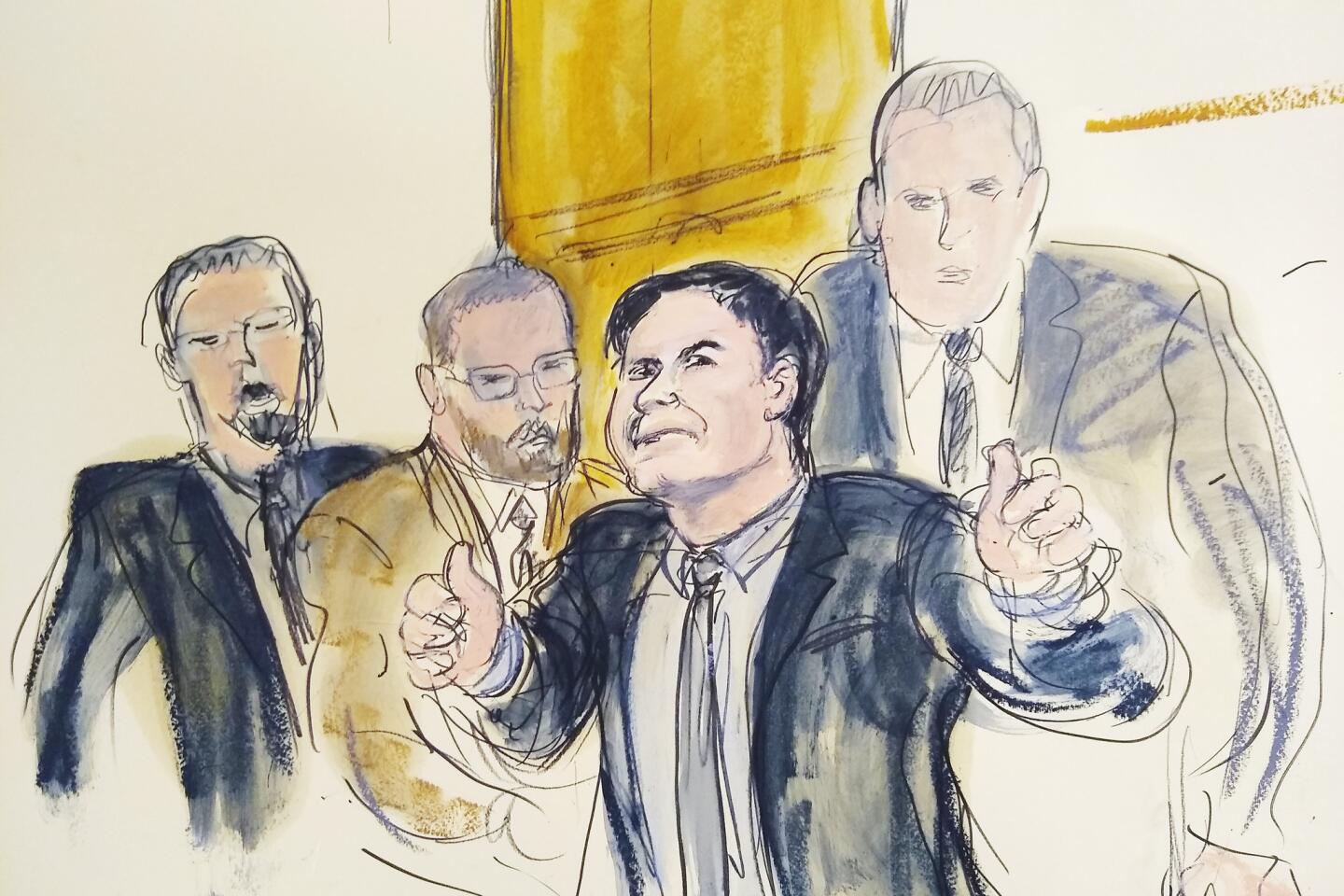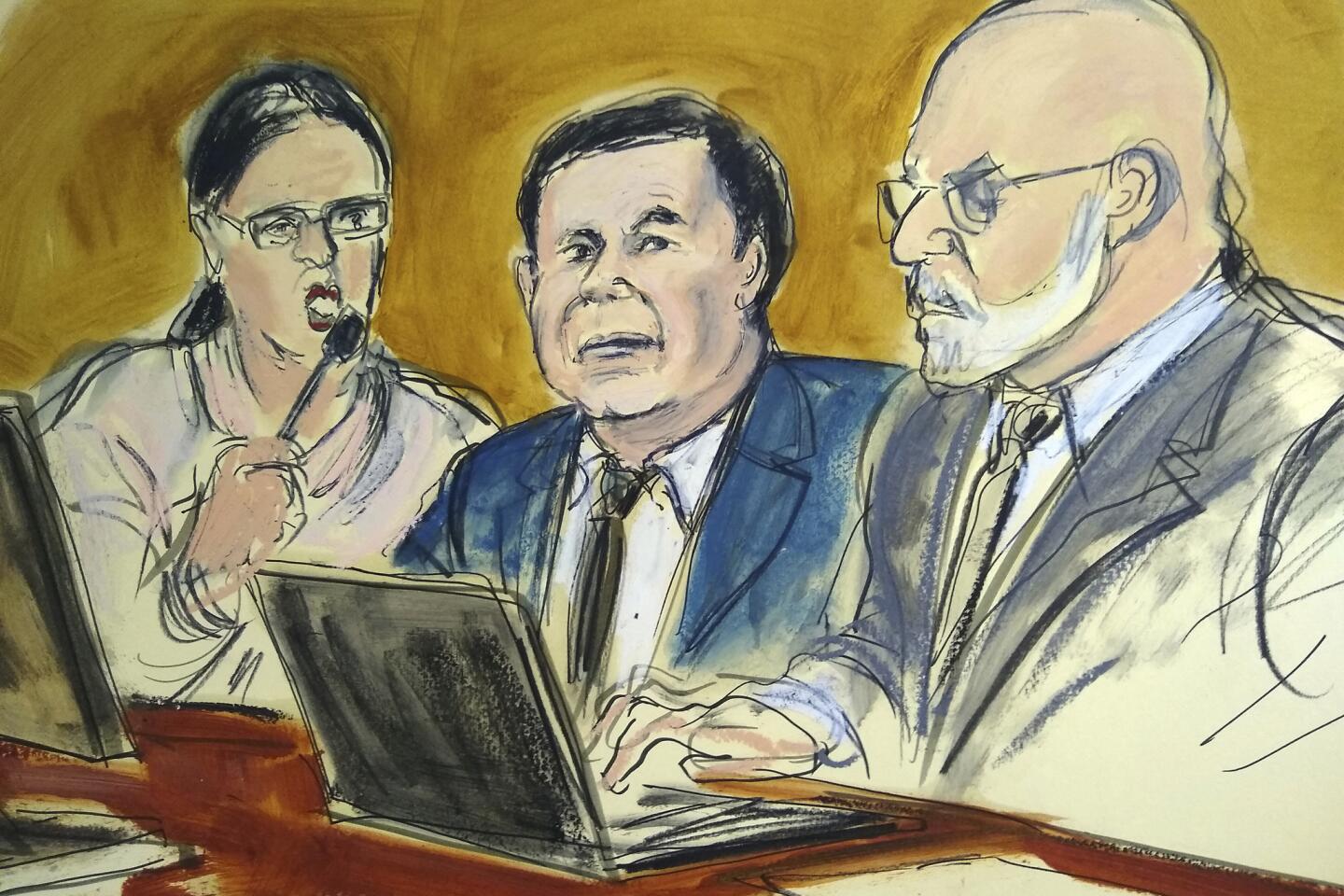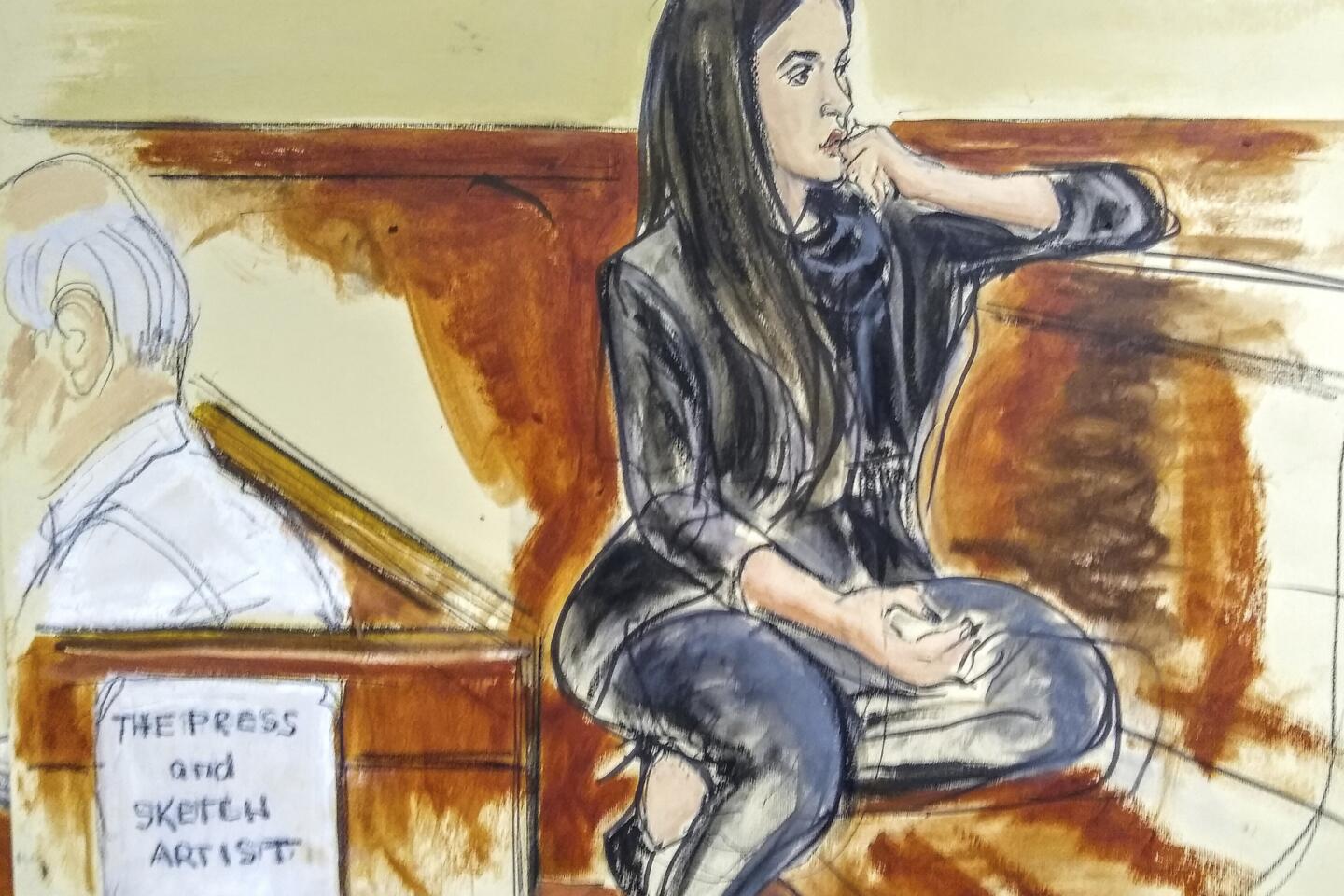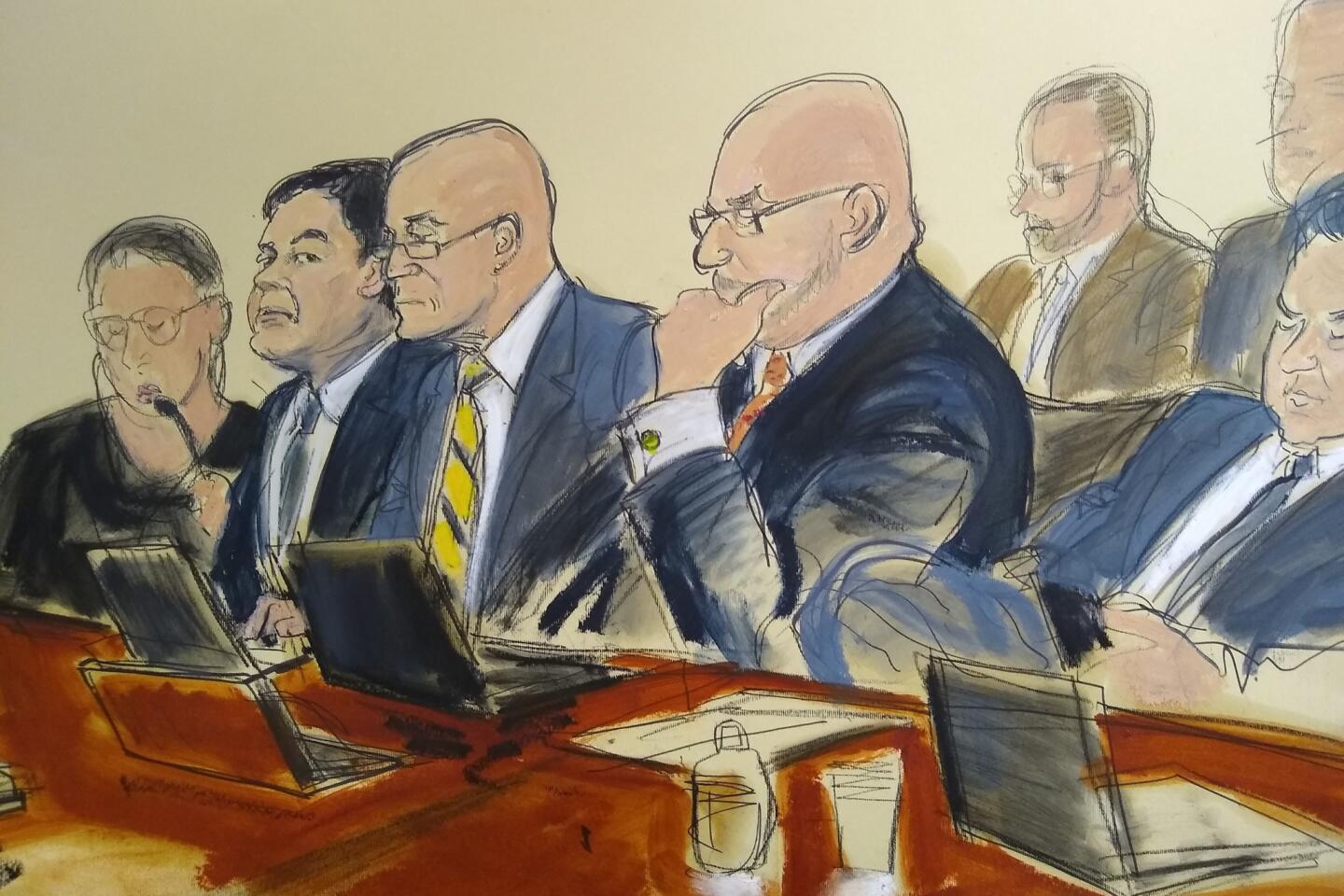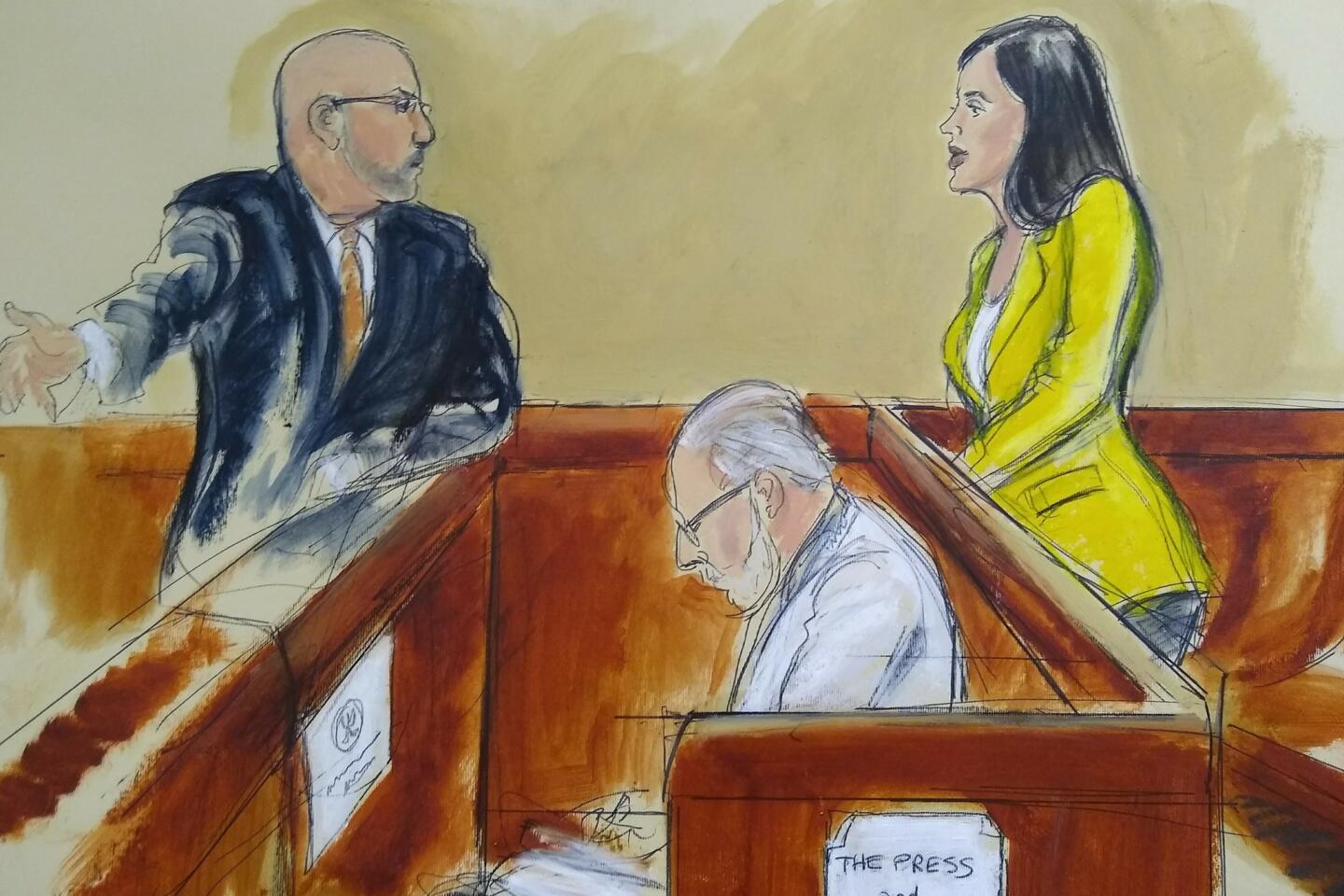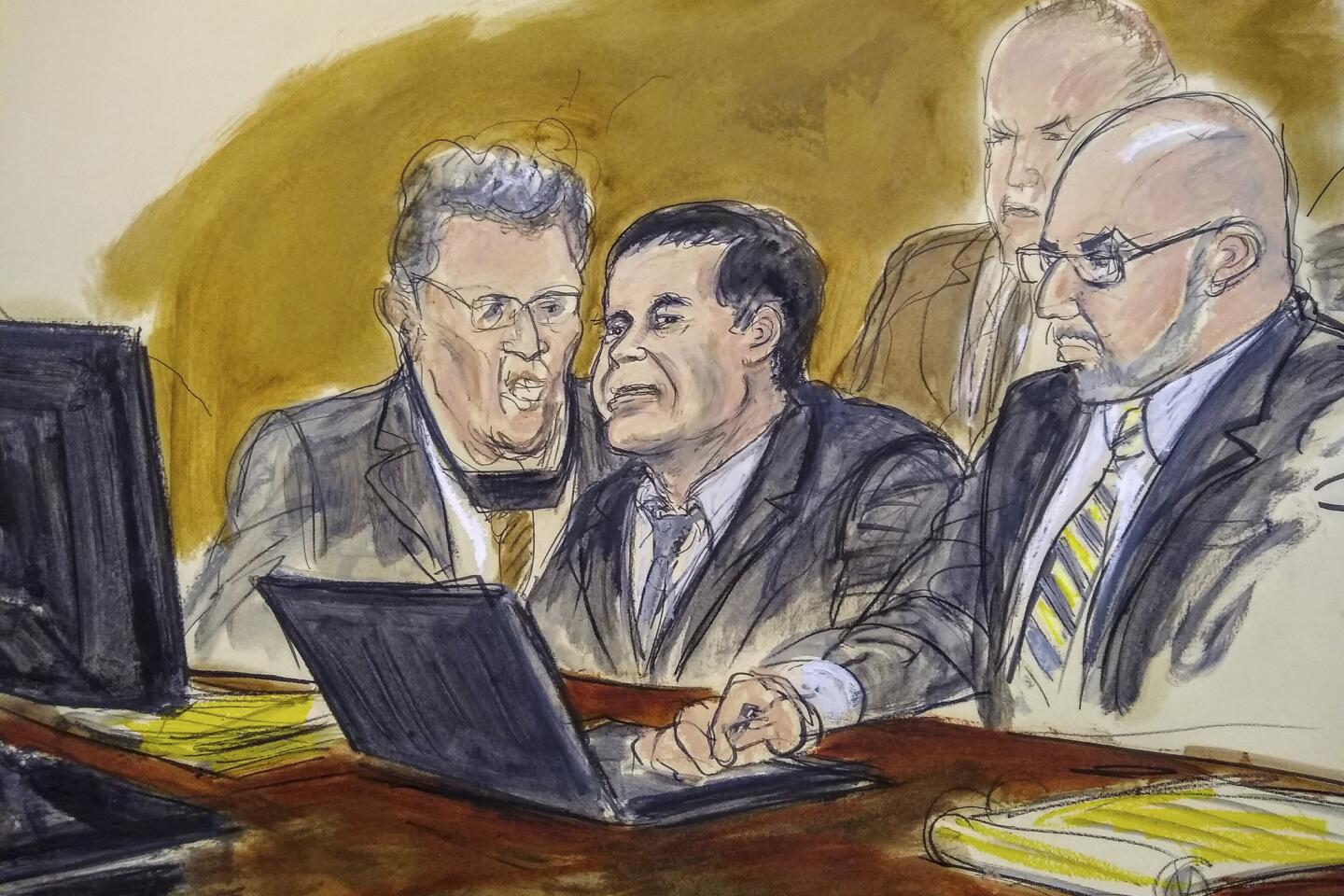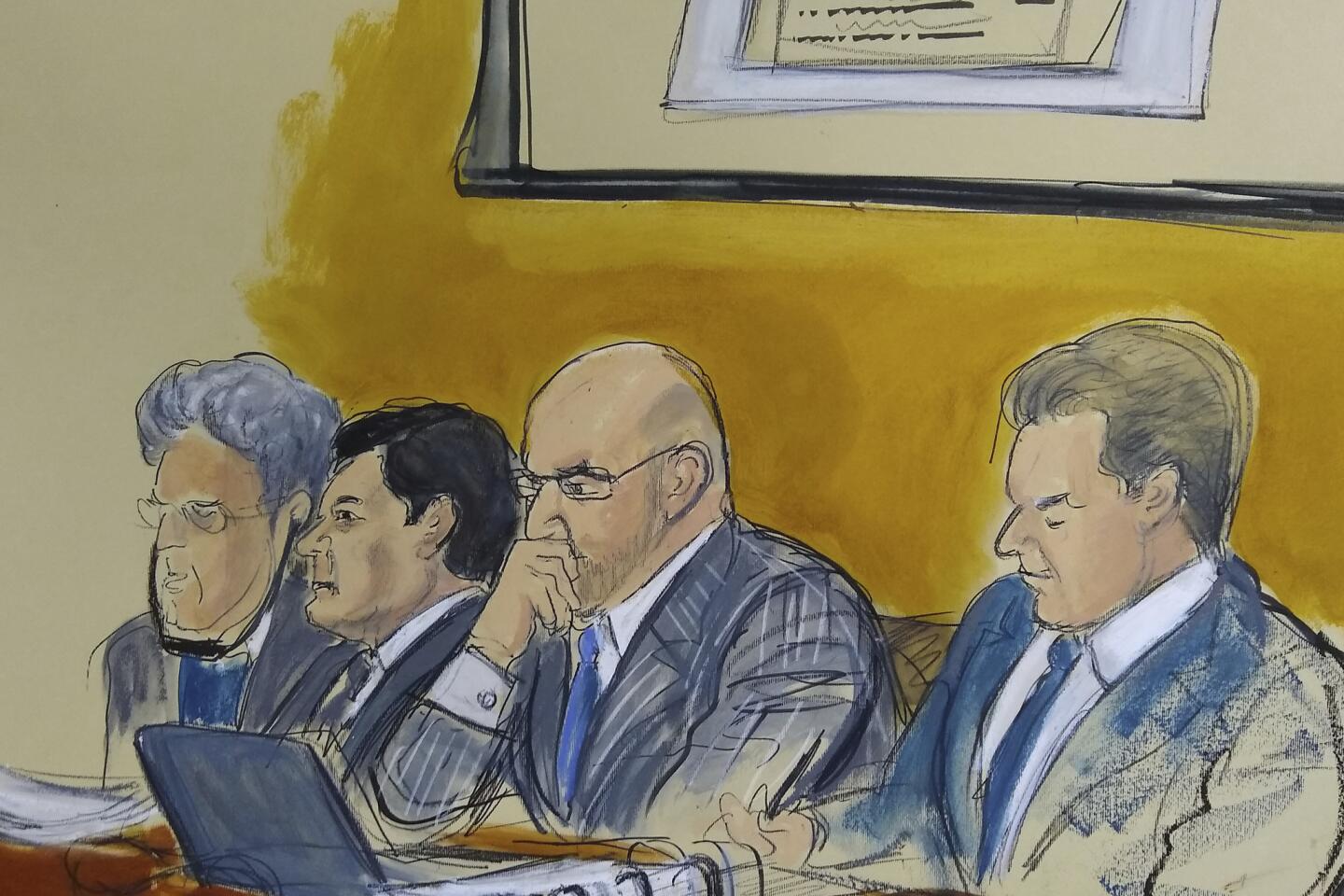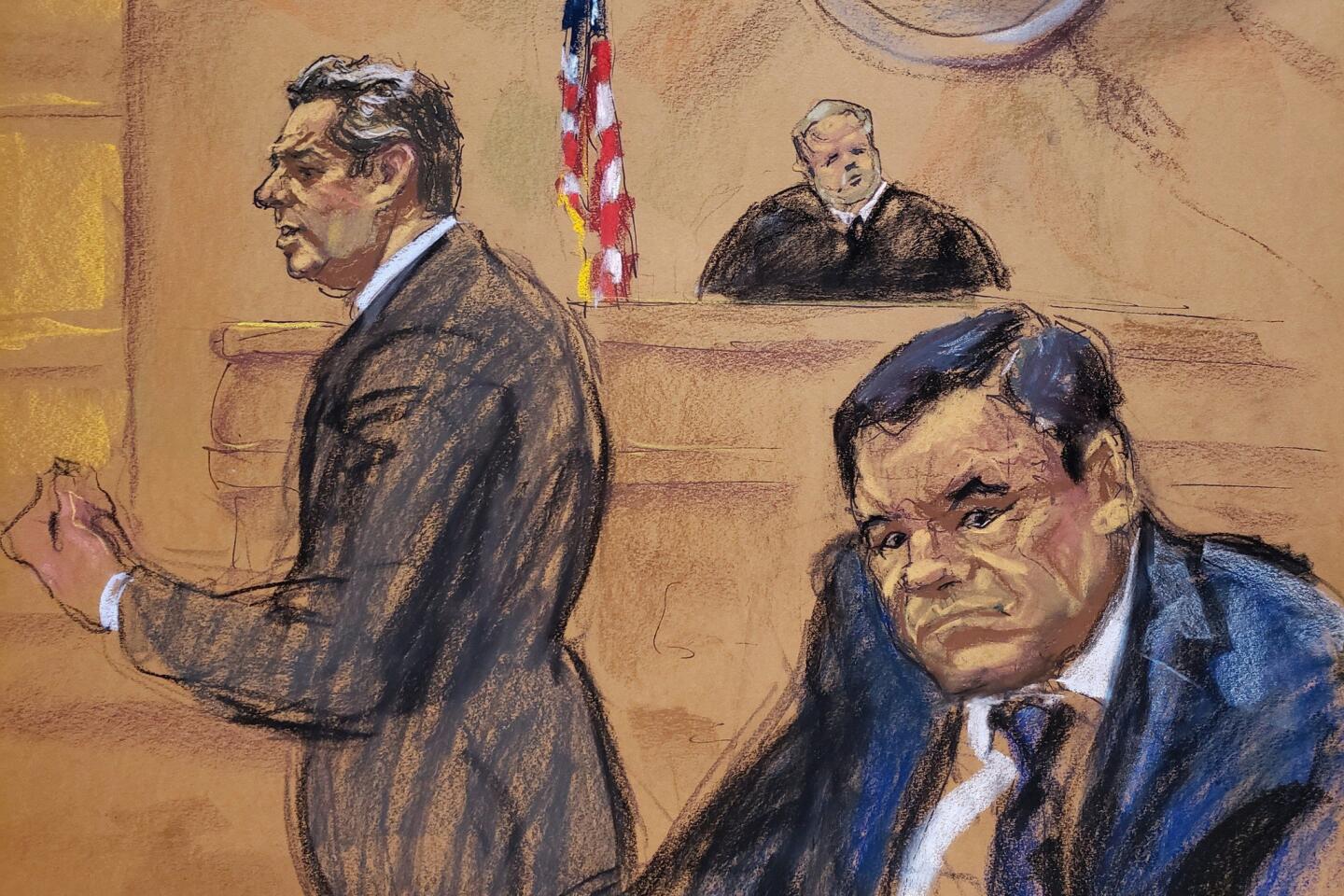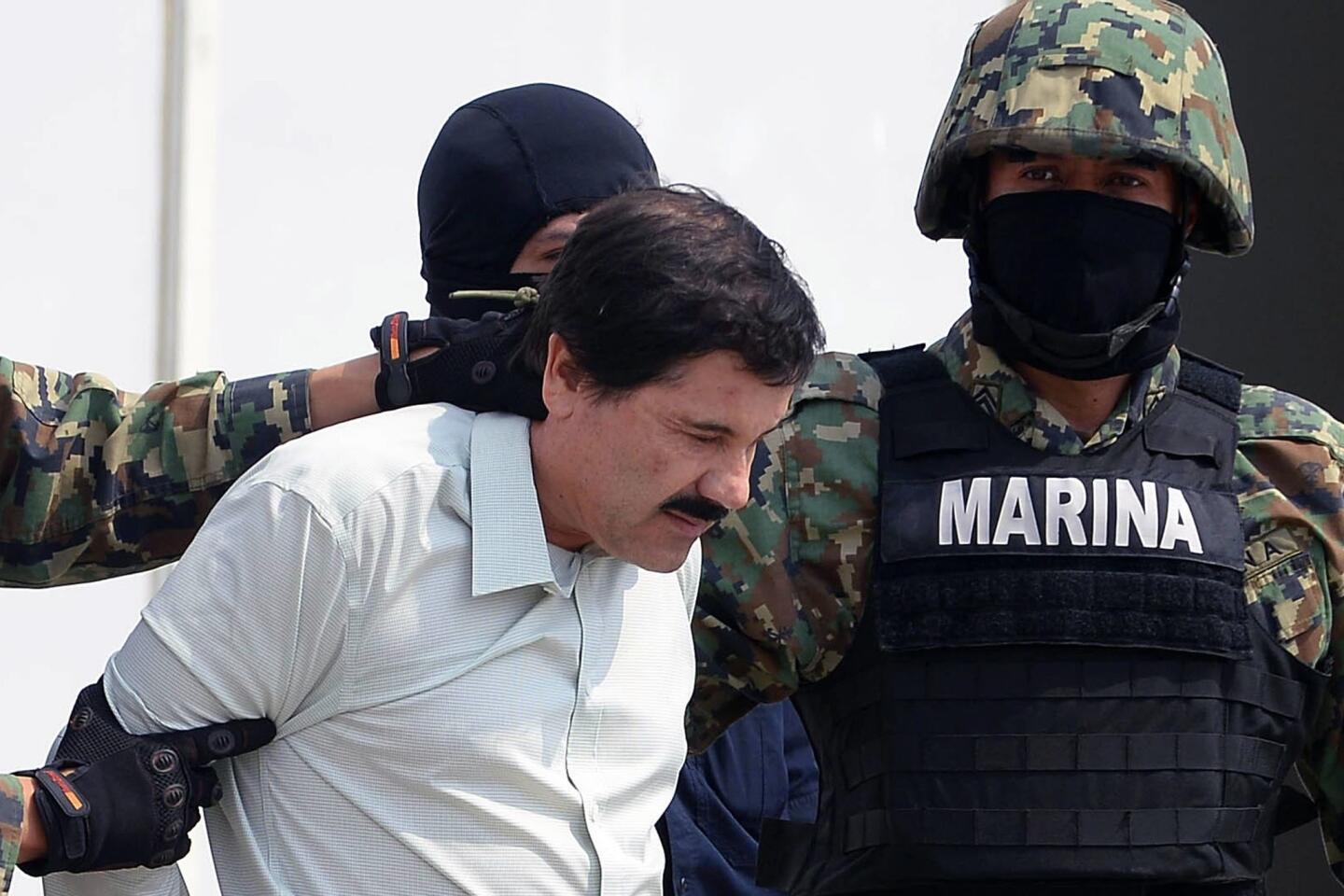‘El Chapo’ found guilty. The Mexican drug lord faces ‘a sentence from which there is no escape’
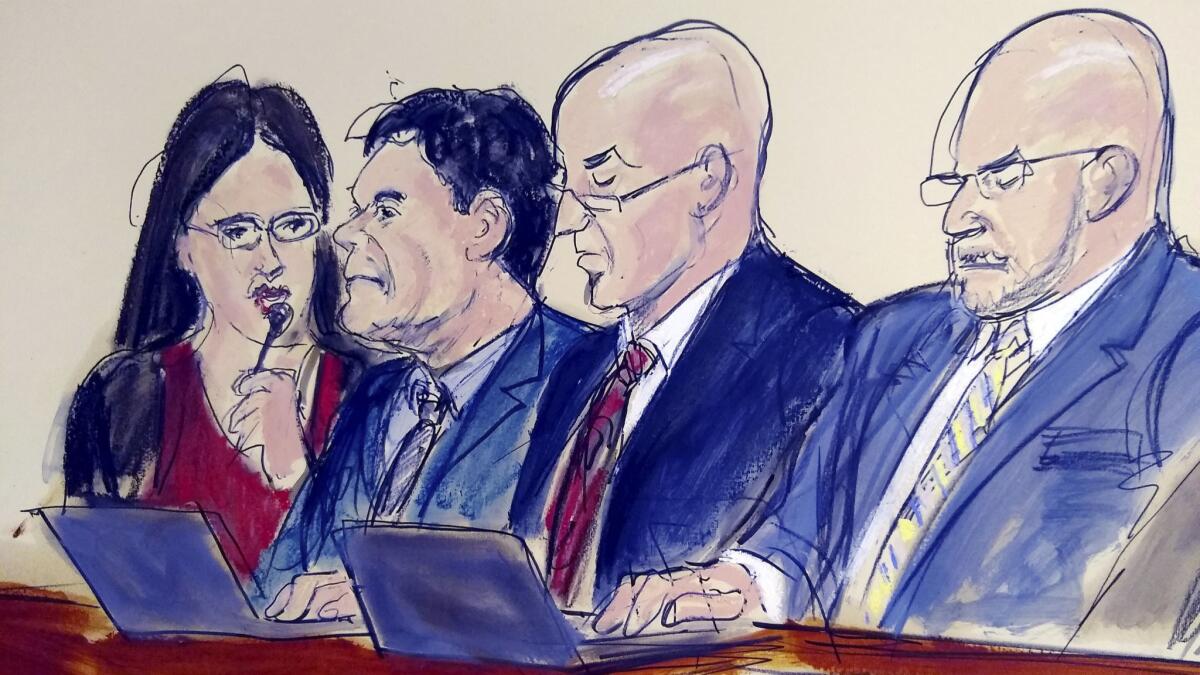
Reporting from New York — Joaquin Guzman, the Mexican drug lord known as “El Chapo,” was found guilty Tuesday in an international narcotics smuggling trial that marked a triumph for the U.S. Justice Department and a steep fall for a brutal narco legend who ruled with a diamond-encrusted pistol on his hip.
The eight-woman, four-man jury took six days to find Guzman guilty of all 10 criminal counts. The 61-year-old, who has escaped from two Mexican prisons, now will almost certainly spend the rest of his life behind bars in the United States. Prosecutors will ask that Guzman be given life with no possibility of parole when he is sentenced June 25.
“It is a sentence from which there is no escape and no return,” U.S. Atty. Richard Donoghue said outside federal court in Brooklyn, as snow fell.
Guzman was convicted of selling hundreds of tons of cocaine, methamphetamine, heroin and marijuana; conspiring to murder a slew of rivals; and running one of the world’s largest drug networks.
He watched the jury with a somewhat blank expression as the guilty verdict for each count was relayed to him by an interpreter. He shook the hands of his lawyers and smiled at his wife, giving her a thumbs-up before being led out of the courtroom.
The case detailed the inner workings of the multibillion-dollar Sinaloa cartel and brought to light stories of drug-land warfare and sweeping accusations of Mexican corruption, from street-level police to the presidency.
Prosecutors spent 11 weeks presenting an “avalanche of evidence” that included more than 50 witnesses, 200 hours of testimony, ledgers of drug deals, a grenade launcher and videos of Guzman’s escape tunnels.

A jury finds Mexican drug lord and escape artist Joaquin “El Chapo” Guzman guilty on all 10 counts in his federal trial on charges of international narcotics smuggling.
The defense, on the other hand, took about half an hour to present its case — one witness and one document — before resting late last month. Guzman’s lawyers argued that the case against their client was a vast multi-state conspiracy.
“Of course we’re going to appeal,” Guzman’s lawyer Jeffrey Lichtman told reporters outside court. He said an appeal may cite restrictive cross-examination questioning or issues with Guzman’s extradition from Mexico.
Lichtman said Guzman was a “trophy” for the government and that his conviction would make no difference in the larger war on drugs.
“The cocaine doesn’t stop flowing with the takedown of El Chapo.”
Joaquin ‘El Chapo’ Guzman was convicted of 10 counts. Here’s how they break down »
The jurors who weighed the case against Guzman spent weeks being ferried by U.S. marshals to and from court, and their identities remain anonymous. They sat through testimony about drug world mayhem, the ingenious ways Guzman had smuggled cocaine into the U.S., and the kingpin’s lavish spending on yachts, beach homes and even a private zoo with lions, panthers and a tiger.
They heard allegations that Guzman bribed a Mexican president-elect and learned that before Guzman was known by the nickname that means “Shorty,” he was dubbed “El Rapido,” or “Speedy,” because he masterminded the quick transport of cocaine through cross-border tunnels in the 1990s.
And in case there was any doubt about how violent the drug lord could be, a final prosecution witness testified about Guzman beating two rival gang members with a stick for hours before shooting each in the head and throwing them into a raging bonfire.
After U.S. District Judge Brian Cogan read the verdicts on Tuesday, he told jurors that their attention to detail was the best he’s seen in his nearly 30 years on the bench.
“The way you went about it was quite remarkable,” he told them. “Quite frankly, it made me proud to be an American.”
U.S. authorities had worked nearly a decade on the case against Guzman, a man whose legend grew after he escaped two maximum-security prisons in Mexico (once allegedly in a laundry cart, once through a tunnel under his cell shower). After his capture in Mexico in 2016, he was extradited to the U.S.
In a courthouse under unprecedented security, the U.S. government took every opportunity to show what all the years of information-gathering on Guzman had produced.
Aided by testimony from a who’s who of former cartel higher-ups, prosecutors painted an epic picture of Guzman: a poor boy from the mountains of northwest Mexico who used his brutal cunning to rise to power, taking the helm of one of the world’s largest drug networks.
Jurors heard how the cartel smuggled cocaine on boats disguised as fishing vessels, between frozen pallets of meat, in submarines and small airplanes, through cross-border tunnels, even in cans of pickled jalapeños.
They listened to scores of intercepted phone messages, with Guzman’s blaring voice arranging drug deals and bribing police commanders; they watched videos of the drug lord interrogating a man whose hands were tied to a pole; they were read dozens of text messages between Guzman and his inner circle; they saw footage of the networks of escape tunnels underneath his homes — each starting under a bathtub lifted by hydraulics to reveal a secret entrance and ladder.
Law enforcement officials told of massive drug busts and of hunting Guzman. But the heart of the prosecution was the litany of cooperating witnesses, members of Guzman’s inner sanctum and now mostly convicted felons testifying against their former boss in hopes of a reduced prison sentence.
Guzman’s defense team tried at every turn to tear down the cooperating witnesses, portraying them as turncoats and liars. The lawyers argued that their client was a scapegoat built into a myth by a corrupt system. The U.S. Justice Department, they charged, would do whatever it could to take down Guzman, including letting a dozen drug bosses go free in exchange for prized testimony.
“Did you even know they give these deals for such bad people? Is that the country you thought you were living in?” Lichtman asked jurors during closing arguments.
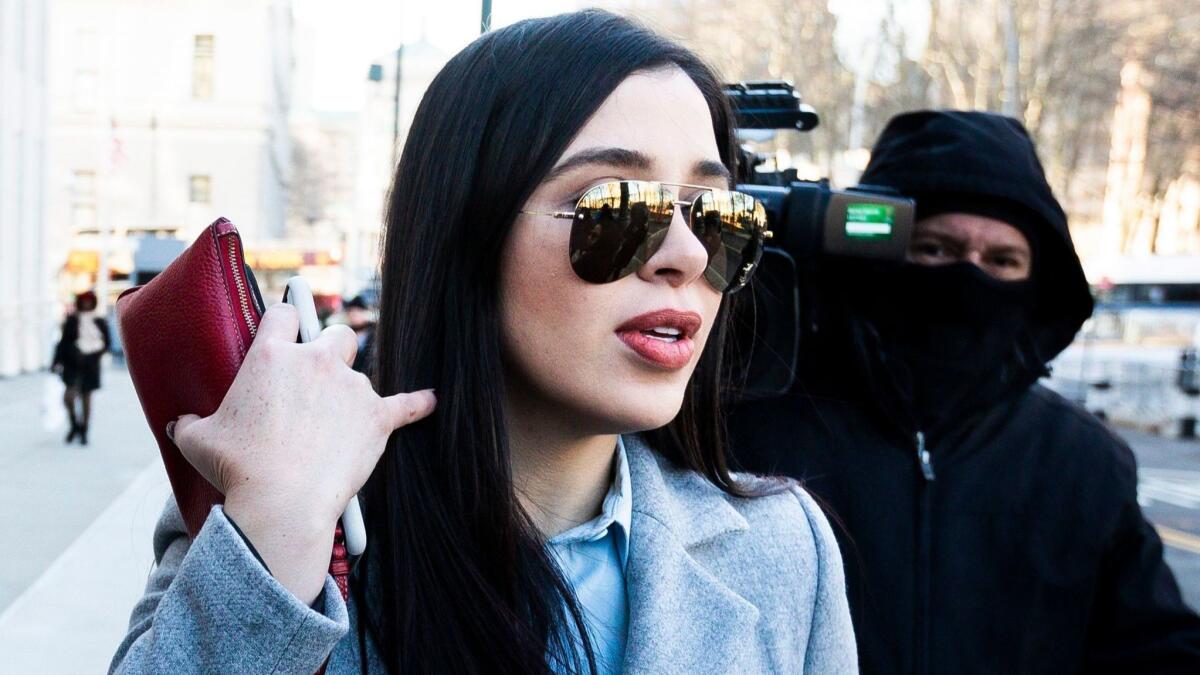
All the while, Guzman, a billionaire drug lord who went from lavish Mexican villas to a tiny prison cell, sat in apparent repose in his well-fitted suits.
He exchanged waves and smiles with his 29-year-old wife, Emma Coronel, a former Mexican beauty queen. She offered little emotion during the hours of testimony, aside from smirking when Guzman’s distraught former mistress took the stand. The next day, while the mistress continued testifying, Coronel wore a burgundy velvet suit blazer that matched her husband’s jacket exactly.
And when Coronel became the center of testimony — a former cartel lieutenant testified she helped coordinate Guzman’s 2015 prison escape — she sat stone-faced.
The laying bare of Guzman’s fantastical and brutal life may seem like a triumph for prosecutors, the trial he deserved. But this is a man who, even in hiding, sought out movie producers to write his own biopic. It is probably the trial he thinks he deserved too.
And so, in a case that has often seemed less about innocence or guilt than the nature of power and the price of justice, the state’s criminal witnesses lined up to betray the emperor. Like Shakespeare’s Roman senators, they became the drama’s stars.
There was the tragic Miguel Angel “El Gordo” Martinez, a former pilot and longtime cartel lieutenant, who, even after a decade of informing on his former boss, still referred to him as “Mr. Guzman.”
He told of the times before he turned on Guzman, when he said the drug lord sent assassins after him four times. The killers came after him in prison, first with knives, then with grenades. Martinez told the jury he feared he’d traded his life for his freedom by continuing to testify.
The judge ordered courtroom artists not to sketch his face.
“I never failed him, never stole from him, never betrayed him; I watched over his family,” he testified in November. “The only thing I received from him was four attempted attacks against me, without saying anything.”
Next on the stand was a silicone wraith in a black parka and gloves, whose face alone was so frightening that one juror turned his chair away. The longtime head of Colombia’s brutal North Valley cartel had undergone numerous surgeries to disguise his identity while he was on the run.
Juan Carlos “Chupeta” Ramirez Abadia, whose nickname means lollipop, had ledgers tracking the more than 150 murders he ordered and sales of tons of cocaine, including to Guzman’s cartel. The friend who kept the ledgers was later poisoned in prison, a fact that seemed to pain the witness less than the drugs he lost to the U.S. Coast Guard. “That’s a tragedy for me as a drug trafficker,” he said.
December brought the truculent Colombian narco family scion Jorge Cifuentes and the Chicago drug boss Pedro Flores, who each introduced tapes in which Guzman could be heard personally negotiating drug deals.
If the first month of the trial set the stage for Guzman’s downfall, the final weeks of testimony were the real showstoppers. The keys to the prosecution case were on full display: traitors, technology — and Guzman’s own paranoia.
There was the surreal tale of Christian Rodriguez, the cartel’s 20-something tech guru, who created a communications system the FBI could not crack. Instead, the government found Rodriguez and made him an informant.
The government learned that Guzman had set up his own vast spying system, monitoring the phones and computers of his cartel leaders, his wife and his mistresses. Rodriguez gave them the key to the treasure trove of information.
Jurors heard text messages between the married couple, including Guzman saying of their 6-month-old daughter, one of their twins: “Our Kiki is fearless. I’m going to give her an AK-47 so she can hang with me.”
The texts also laid out details of the drug leader’s cartel life as a wanted man, from the banal to the bizarre. In one he asked Coronel to buy him pants (size 32/30), shoes (Mexican size 7) and black mustache dye. In another he told her about barely escaping a police raid on his Los Cabos, Mexico, home in 2012.
“I saw them pounding on the door next door, but I was able to jump out,” he wrote to his wife, who married Guzman when she was 18.
“Oh, love. That’s horrible,” she responded. “I’ll be watching the news to see what they say, love.”
Then came a star for the prosecution — and a punching bag for the defense — Vicente Zambada, the most senior cartel member to testify at trial. Tall and with a square jaw, the 43-year-old, even in his navy blue prison jumpsuit, still resembled the billionaire cartel prince he once was.
When he took the stand, Zambada nodded at Guzman, his son’s godfather. The defendant returned the gesture with a grin. Zambada, in jail for drug trafficking since his 2009 arrest, is the son of Ismael “El Mayo” Zambada, the man defense lawyers say was the real leader of the cartel.
Vicente Zambada coolly detailed how he helped Guzman and his father traffic drugs and guns, order the torture and killings of rivals and pay off scores of Mexican officials with a monthly bribe budget of about $1 million. The cartel was planning to discuss with representatives of Mexico’s state oil company a scheme to transport 100 tons of cocaine in an oil tanker to the U.S.
With Guzman intently listening, Zambada’s testimony seemed more like a trip down memory lane for the men than a rebuke of his former boss or his former lifestyle.
He told jurors that his father and the defendant met high in the mountains of Mexico’s Sinaloa state soon after Guzman made his first prison escape, in 2001. Guzman was struggling financially then, Zambada said, but his father told Guzman, “I’m 100% with you” and agreed to share their kilos of cocaine equally.
For the defense, the testimony was ammunition for one of its central arguments: Zambada’s father, not Guzman, was the true power behind the Sinaloa cartel, and Guzman was set up to take the fall for him.
“Was your Papa Mayo a social worker?” defense attorney Eduardo Balarezo asked sarcastically.
“I know that in the past he was a worker,” Zambada replied flatly through his interpreter, drawing laughs from the courtroom.
“What I meant was, your father wasn’t in the business of helping struggling drug traffickers,” Balarezo said.
Prosecutors went after Guzman because he was famous, while the elder Zambada remained “in the shadows” and helped them pin Guzman, Balarezo said.
“If he hasn’t been arrested, it’s not my fault,” Vicente Zambada said.
Perhaps the most headline-grabbing testimony came from Alex Cifuentes, the brother of Jorge Cifuentes and Guzman’s self-professed “left-hand man” and “right-hand man.”
Jurors learned during defense questioning that Cifuentes had told authorities that Guzman paid $100 million to Mexico’s president-elect in 2012, Enrique Peña Nieto. Cifuentes said Peña Nieto asked for $200 million, but Guzman bargained him down. (The former president has denied the claims.) Cifuentes also told authorities, however, that Guzman was $20 million in debt between 2007 and 2013.
Lichtman, Guzman’s lawyer, offered up another take on the bribe allegation during his closing argument: It was Ismael Zambada who paid out those millions and that’s why he was still free. Cifuentes, like all the other cooperating witnesses, was a violent liar, an “utter animal” who’d say whatever it took to get out of jail, Lichtman said.
It made more sense, he argued, that Zambada, the real Sinaloa cartel leader, would pay that bribe.
Why would Guzman, who was in hiding and in debt, he asked, pay money he didn’t have to a president who would end up having him arrested and sent to the U.S. to face trial? He didn’t, Lichtman said. That bribe, he insisted, is why Zambada remains free.
Cifuentes’ testimony also offered fodder for another defense argument: Guzman wasn’t a murderous cartel mastermind; he was a showman, a braggart in love with fame. Cifuentes testified that for six years, he worked with his boss on a script and book about his life. Guzman even flew in a producer from Colombia to his mountain hideouts to discuss the film project — which he planned to direct.
El Chapo is likely going to prison for the rest of his life. That probably won’t make Mexico safer »
Cifuentes said Guzman told the producer a story about the army hanging him up by his feet from a helicopter to scare him, but he “never gave up the drugs.” Those tales, Lichtman insisted, were clearly fantastical.
And to hype the cartel even more? One of Guzman’s lieutenants, Cifuentes testified, made hats and T-shirts imprinted with “Cartel Sinaloa.”
Guzman, Lichtman told jurors in his closing, is “a human being” and he “has feelings too.” His voice breaking, the attorney asked them not to “give into the myth of El Chapo.”
But in the prosecution’s closing, Assistant U.S. Atty. Andrea Goldbarg reminded jurors of Guzman’s many flights from justice: “He’s sitting right there. Do not let him escape responsibility. Hold him accountable for his crimes. Find him guilty on all counts.”
Plagianos and Sharp are special correspondents. Plagianos reported from New York and Sharp from Los Angeles.
More to Read
Sign up for Essential California
The most important California stories and recommendations in your inbox every morning.
You may occasionally receive promotional content from the Los Angeles Times.
